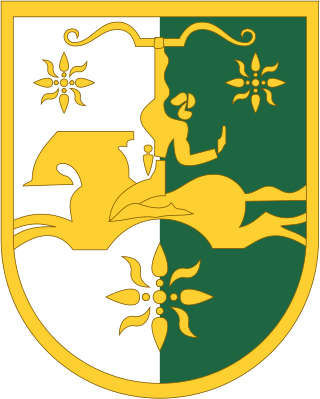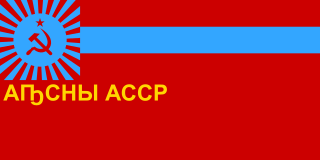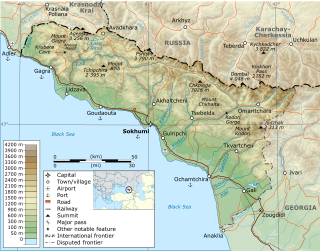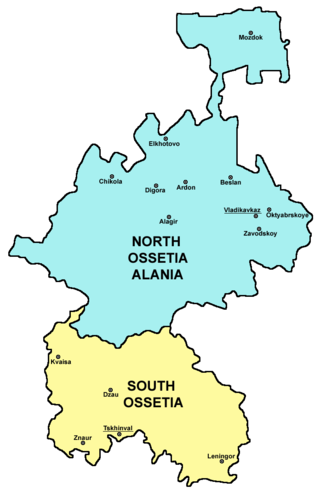
Gagra is a town in Abkhazia/Georgia, sprawling for 5 km on the northeast coast of the Black Sea, at the foot of the Caucasus Mountains. Its subtropical climate made Gagra a popular health resort in Imperial Russian and Soviet times.

Politics in Abkhazia is dominated by its conflict with Georgia. Abkhazia became de facto independent from Georgia after the 1992–1993 war, but its de jure independence has only been recognised by a few other countries. Abkhazia is a presidential representative democratic republic with a multi-party system, wherein the President is both head of state and head of government. Executive power is exercised by the government of the Republic of Abkhazia. Legislative power is vested in both the government and the People's Assembly of Abkhazia.
The Kodori Valley, also known as the Kodori Gorge, is a river valley in Abkhazia, Georgia's breakaway autonomous republic. The valley's upper part, populated by Svans, was the only corner of the post-1993 Abkhazia directly controlled by the central Georgian government, which since 2006 officially styles the area as Upper Abkhazia. On August 12, 2008, Russo–Abkhazian forces gained control of the Upper Kodori Valley, previously controlled by Georgia.

The Abkhazia conflict is a territorial dispute over Abkhazia, a region on the eastern coast of the Black Sea in the South Caucasus, at the intersection of Eastern Europe and Western Asia. The conflict involves Georgia, Russian Federation and Russian-backed self-proclaimed Republic of Abkhazia, internationally recognised only by Russia, Venezuela, Nicaragua, Nauru, and Syria; Georgia and all other United Nations members consider Abkhazia a sovereign territory of Georgia. However, as of 2023, Georgia lacks de facto control over the territory.

The Abkhazians or Abkhazes are a Northwest Caucasian ethnic group, mainly living in Abkhazia, a disputed region on the northeastern coast of the Black Sea. A large Abkhaz diaspora population resides in Turkey, the origins of which lie in the population movements from the Caucasus in the late 19th century. Many Abkhaz also live in other parts of the former Soviet Union, particularly in Russia and Ukraine.

The Kingdom of Abkhazia, also known Egrisi-Abkhazia, was a medieval feudal state in the Caucasus which was established in the 780s. Through dynastic succession, it was united in 1008 with the Kingdom of the Iberians, forming the Kingdom of Georgia.
The Government of the Autonomous Republic of Abkhazia is an administration established by Georgia as the legal and only government of Abkhazia. Abkhazia has been de facto independent of Georgia – though with limited international recognition – since the early 1990s. Ruslan Abashidze, elected in May 2019, is the current head of the government-in-exile.

The history of Abkhazia, a region in the South Caucasus, spans more than 5,000 years from its settlement by the lower-paleolithic hunter-gatherers to its present status as a partially recognized state.

The Abkhaz Autonomous Soviet Socialist Republic, abbreviated as Abkhaz ASSR, was an autonomous republic of the Soviet Union within the Georgian SSR. It came into existence in February 1931, when the Socialist Soviet Republic of Abkhazia, originally created in March 1921, was transformed to the status of Autonomous Soviet Socialist Republic within the Georgian SSR.

The Socialist Soviet Republic of Abkhazia was a short-lived republic within the Caucasus region of the Soviet Union that covered the territory of Abkhazia, and existed from 31 March 1921 to 19 February 1931. Formed in the aftermath of the Red Army invasion of Georgia in 1921, it was independent until 16 December 1921 when it agreed to a treaty that united it with the Georgian Soviet Socialist Republic. The SSR Abkhazia was similar to an autonomous Soviet republic, though it retained nominal independence from Georgia and was given certain features only full union republics had, like its own military units. Through its status as a "treaty republic" with Georgia, Abkhazia joined the Transcaucasian Soviet Federative Socialist Republic, which united Armenian, Azerbaijani, and Georgian SSRs into one federal unit when the latter was formed in 1922. The SSR Abkhazia was abolished in 1931 and replaced with the Abkhaz Autonomous Soviet Socialist Republic within the Georgian SSR.

The War in Abkhazia was fought between Georgian government forces for the most part and Abkhaz separatist forces, Russian government armed forces and North Caucasian militants between 1992 and 1993. Ethnic Georgians who lived in Abkhazia fought largely on the side of Georgian government forces. Ethnic Armenians and Russians within Abkhazia's population largely supported the Abkhazians and many fought on their side. The separatists received support from thousands of North Caucasus and Cossack militants and from the Russian Federation forces stationed in and near Abkhazia.
The Sukhumi riot was a riot in Sukhumi, Abkhaz Autonomous Soviet Socialist Republic, Georgian Soviet Socialist Republic, Soviet Union, in July 1989, triggered by an increasing inter-ethnic tensions between the Abkhaz and Georgian communities and followed by several days of street fighting and civil unrest in Sukhumi and throughout Abkhazia.

The Battle of the Kodori Valley was a military operation during the Russo-Georgian War in the Upper Kodori Valley of Abkhazia, a breakaway region of Georgia. It was the only part of Abkhazia under Georgian control before this military conflict. On 9 August 2008, the Abkhaz military, with support by Russian forces, launched an operation to remove the remaining Georgian troops from the disputed gorge. After three days, the Georgian military left the Upper Kodori Valley.

This article describes the background of the Russo-Georgian War.

Abkhazia, officially the Republic of Abkhazia, is a partially recognised state in the South Caucasus, on the eastern coast of the Black Sea, at the intersection of Eastern Europe and Western Asia. It covers 8,665 square kilometres (3,346 sq mi) and has a population of around 245,000. Its capital and largest city is Sukhumi.

Abkhazia and South Ossetia are disputed territories in the Caucasus. Most countries recognise them as part of Georgia, while Russia, Venezuela, Nicaragua, Nauru, and Syria regard them as independent. Russia's initial recognition of the independence of Abkhazia and South Ossetia occurred in the aftermath of the Russo-Georgian War in 2008. The government of Georgia considers the republics to be Russian-occupied territories.

The Georgia–Russia border is the state border between Georgia and Russia. It is de jure 894 km in length and runs from the Black Sea coast in the west and then along the Greater Caucasus Mountains to the tripoint with Azerbaijan in the east, thus closely following the conventional boundary between Europe and Asia. In 2008 Russia recognised the independence of two self-declared republics within Georgia, meaning that in a de facto sense the border is now split into four sections: the Abkhazia–Russia border in the west, the western Georgia–Russia border between Abkhazia and South Ossetia, the South Ossetia–Russia border and the eastern Georgia–Russia border between South Ossetia and Azerbaijan. At present most of the international community refuse to recognise the independence of the two territories and regard them as belonging to Georgia.
This is an alphabetical list of Abkhazia-related articles.

The Abkhazia–Georgia separation line is a de facto boundary set up in aftermath of the War in Abkhazia and Russo-Georgian War, which separates the self-declared Republic of Abkhazia from the territory controlled by the Government of Georgia. Republic of Abkhazia, and those states that recognise its independence, view the line as an international border separating two sovereign states, whereas the Georgian government and most other countries refer to it as an 'Administrative Border Line' within Georgian territory. The Georgian government views Abkhazia as a Russian-occupied Georgian territory and designates the de facto boundary as an occupation line in accordance with the Georgian "Law on Occupied Territories of Georgia". The Constitution of Georgia recognizes Abkhazia as autonomous within Georgia, therefore the line corresponds to the 'Administrative Border' of the Autonomous Republic of Abkhazia within Georgian territory.

South Ossetia is a partially recognized and Russian-occupied separatist state internationally recognized as part of Georgia. It is mainly inhabited by Ossetians, an ethnic group also dominant in North Ossetia, which is part of Russia. South Ossetia separated itself from Georgia following the 1991–1992 South Ossetia War with the help of Russia, remaining ever since as a state closely allied with this country.














